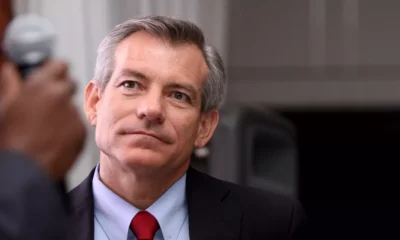Fashion
Panel Endorses Groundbreaking Move to Limit Lawmaker Immunity

Governor Katie Hobbs stated that Senator Jake Hoffman is not entitled to legislative immunity regarding a speeding violation from last month, where he was clocked driving 89 mph, 24 over the limit. Furthermore, she emphasized that no legislator should be exempt from prosecution for such offenses both now and in the future.
Hobbs referenced a 2018 executive order issued by former Governor Doug Ducey, which she confirmed remains valid. This order instructs the Department of Public Safety (DPS) to regard criminal speeding—defined as exceeding the speed limit by more than 20 mph—as a “breach of the peace.”
This designation is significant because the state constitution protects lawmakers from arrest during legislative sessions except in cases of treason, felony, or breaches of peace. Ducey’s directive stemmed from an incident involving a legislator who was not cited after driving 97 mph in a 55 mph zone, invoking the privilege of legislative immunity.
The 2018 order applies exclusively to law enforcement officers in Arizona, including those from the DPS and the Department of Transportation. Hobbs noted that “it is clear in some recent cases that the peace has been breached,” emphasizing the need for law enforcement to uphold the law impartially.
While acknowledging officer discretion in issuing citations, Hobbs expressed her belief that elected leaders should adhere to the same laws as the public. She indicated support for an amendment that would eliminate this immunity for traffic violations across jurisdictions.
“I think our lawmakers, people that are elected to pass laws, should be held to at minimum the same standards as everyone else, if not a higher standard,” Hobbs stated. A proposal to remove this immunity, led by Rep. Quang Nguyen, R-Prescott Valley, advanced in the House Judiciary Committee with a vote of 6-3.
The proposal was sparked by incidents where lawmakers, including Senator Mark Finchem, successfully dismissed traffic tickets by invoking their legislative status. Cases like these have raised concerns about the appropriateness of such immunity, as seen with Hoffman and others in recent months.
Support for the proposal crossed party lines, with both Democrats and Republicans arguing against the blanket immunity that allows lawmakers to evade consequences for speeding. Rep. Alma Hernandez, D-Tucson, noted, “If you’re breaking the law, you get a ticket. Pay your darn ticket.”
Some committee members expressed frustration at the need for a public vote on the amendment rather than enacting it immediately. Rep. Selina Bliss, R-Prescott, voiced her wish for quicker action, stressing that lawmakers should not be afforded special treatment due to their positions.
Opposition arose from a few Republicans who argued that the executive branch could abuse the proposed changes to target politicians they disagree with. “This is a time to be strengthening legislative immunity,” Rep. Alexander Kolodin suggested, illustrating concerns about governmental overreach.
Despite differing views on the immunity provision, the ongoing discussions highlight a collective desire for integrity in governance. “This is about bringing back the integrity to the House of Representatives,” Nguyen remarked, rebutting suggestions that the immunity was necessary for legislative functions.
As the discourse continues, both supporters and opponents of the measure will look to future legislative sessions and potential amendments to assess the balance between accountability and legislative privilege.


















